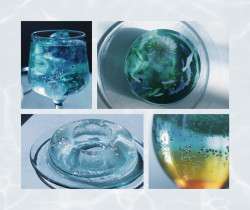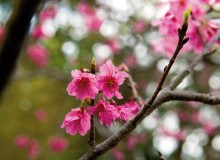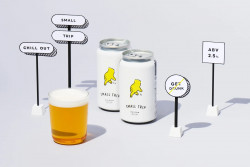
September 16, 2010
Plastics
The ’80s techno-pop groundbreakers reunite, looking for closure
By Metropolis
Originally published on metropolis.co.jp on September 2010

Courtesy of Victor Records
The Shibuya studio of Plastics guitarist and vocalist Hajime Tachibana is decorated with examples of his typography and other graphic design pieces, a testament to what he’s been up to since his seminal techno-pop band broke up. And that’s plenty: Plastics disbanded in 1982 after only four years and three studio albums. Though underappreciated in Japan at the time, their spunky sound found an enthusiastic audience with overseas acts like The B-52s, and influenced newer Japanese groups like Polysics.
To mark the 30th anniversary of the band’s debut, Tachibana recently reunited with Toshio Nakanishi (vocals, guitar), Masahide Sakuma (keyboards) and Goto Yashiki (drums). (Former vocalist Chika Sato, who now resides in London, was the only original member absent.) The resulting tour not only provided the first chance for younger fans to catch the group live, but also an opportunity for Plastics to deal with unfinished business.
For Tachibana, the band’s genesis is inextricably linked to the period 30 years ago when Japan as a whole was defining its identity. Whereas in the West, pop culture emerged in the ’50s as a way for young people to express themselves, he says, Japan lagged behind. One thing the country had working against it was the idea that “modernization” was synonymous with “Westernization.”

“Whether you’re talking about music, fashion or architecture, the ‘real thing’ was overseas,” he says. “There was this mentality that we had to catch up with and overtake the West, and people went at it full throttle from the ’50s through the ’70s. Thinking that we hadn’t even caught up, at some point we outstripped the West. And the point at which people realized that was in 1980.”
Tachibana and his bandmates wanted to show that “in Japan, too, there were young people with new traditions and a new consciousness,” making music that was neither a mere copy nor an overt Japanization of Western trends.
“I guess from the point of view of Westerners, the idea of Asians playing rock was somehow exotic, even without us wearing kimonos. But what we were doing was something even they hadn’t really heard before.”
At least Western audiences were ready for them stylistically, something that couldn’t be said of Japan. This fact kept Plastics overseas for the majority of their short career.
“In 1980 in New York you had Studio 54, you had the club scene coming up, and nightlife changing from rock bands playing venues like CBGB to this dance-club culture. Bands would play gigs at clubs, too. So it was inevitable that Plastics would play overseas. It was much more natural; more people understood what we were doing.”
Having enjoyed their 15 minutes of fame overseas, the group felt it had left something undone. “In actuality, we really wanted to play in Japan, to have that kind of a scene here,” Tachibana explains. “But at that time, we didn’t have the power to produce something like that. Even if we had been able to, it probably wouldn’t have taken off.”

Japan is now up to speed, thanks in part to the recognition that Plastics and their contemporaries YMO received after achieving success abroad. The recent Plastic Production shows at Unit in Tokyo and Noon in Osaka attempted to recreate the feel of the band’s ’70s gigs. They played their old instruments and reproduced the costumes they wore in 1979—hardhats and white coveralls with stenciled graffiti. Guest appearances by three female musicians gave the lineup youthful energy and brought back a bit of the rock-chick attitude that was lacking with Sato absent.
Playing with a younger supporting cast made Tachibana realize that the band’s dream of an independent and unique Japanese pop culture had come true. “But it wasn’t as if we were saying, ‘As long as your generation is doing such a great job, we’ll just leave things up to you and retire now.’ It wasn’t a baton-passing ceremony, it was saying, ‘Let’s carry this baton together.’”
The reunion also brought about a kind of catharsis. Tachibana admits there was competition among the former members and says the reunion was a way of reconciling themselves. “I felt I owed something to the Plastics, including myself,” he says. “By getting together this time, it’s a way of saying to each other, ‘It’s fine, these things happen in life.’”
Welcome Plastics, Origato Plastico, and Welcome Back are available on Victor Records and for download on iTunes. For more info, see www.jvcmusic.co.jp/plastics30.







